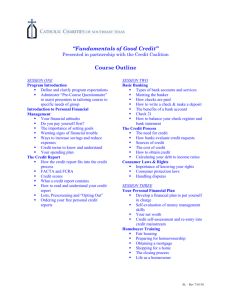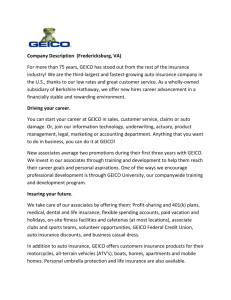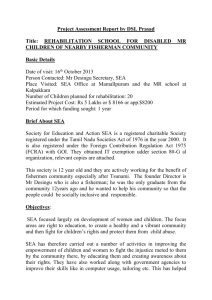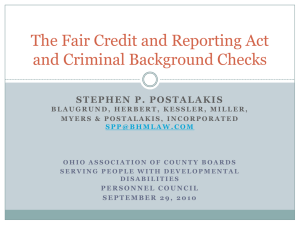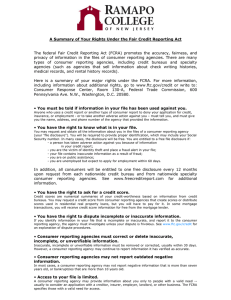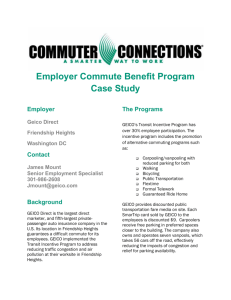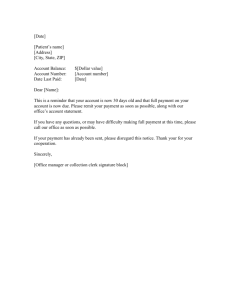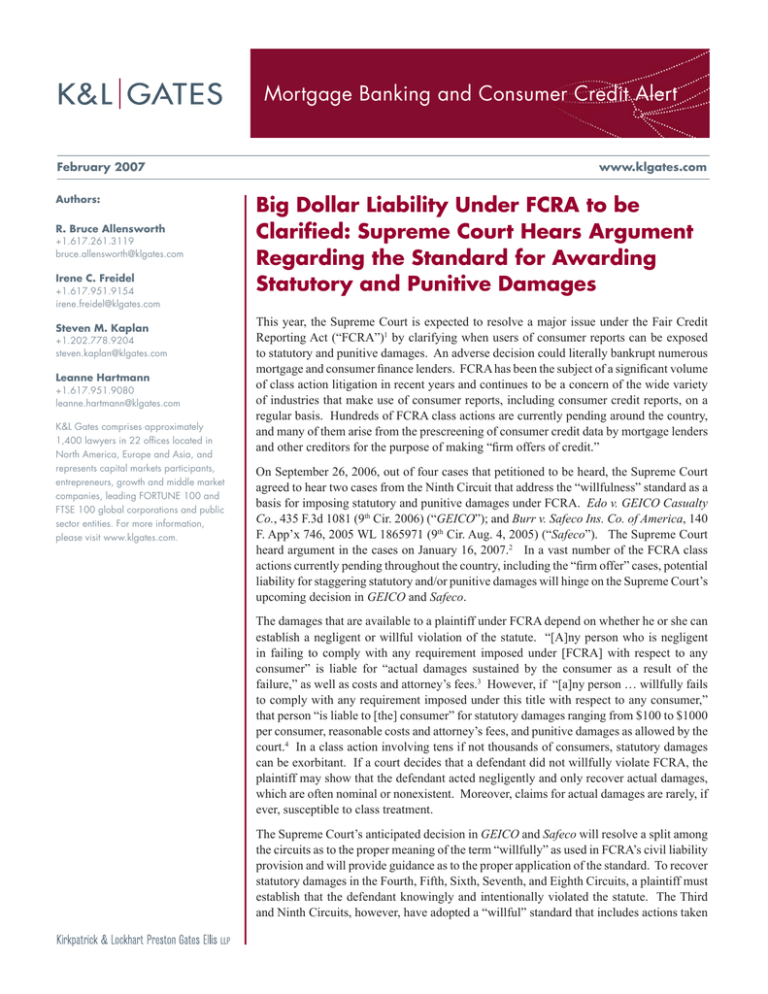
Mortgage Banking and Consumer Credit Alert
February 2007
Authors:
R. Bruce Allensworth
+1.617.261.3119
bruce.allensworth@klgates.com
Irene C. Freidel
+1.617.951.9154
irene.freidel@klgates.com
Steven M. Kaplan
+1.202.778.9204
steven.kaplan@klgates.com
Leanne Hartmann
+1.617.951.9080
leanne.hartmann@klgates.com
K&L Gates comprises approximately
1,400 lawyers in 22 offices located in
North America, Europe and Asia, and
represents capital markets participants,
entrepreneurs, growth and middle market
companies, leading FORTUNE 100 and
FTSE 100 global corporations and public
sector entities. For more information,
please visit www.klgates.com.
www.klgates.com
Big Dollar Liability Under FCRA to be
Clarified: Supreme Court Hears Argument
Regarding the Standard for Awarding
Statutory and Punitive Damages
This year, the Supreme Court is expected to resolve a major issue under the Fair Credit
Reporting Act (“FCRA”)1 by clarifying when users of consumer reports can be exposed
to statutory and punitive damages. An adverse decision could literally bankrupt numerous
mortgage and consumer finance lenders. FCRA has been the subject of a significant volume
of class action litigation in recent years and continues to be a concern of the wide variety
of industries that make use of consumer reports, including consumer credit reports, on a
regular basis. Hundreds of FCRA class actions are currently pending around the country,
and many of them arise from the prescreening of consumer credit data by mortgage lenders
and other creditors for the purpose of making “firm offers of credit.”
On September 26, 2006, out of four cases that petitioned to be heard, the Supreme Court
agreed to hear two cases from the Ninth Circuit that address the “willfulness” standard as a
basis for imposing statutory and punitive damages under FCRA. Edo v. GEICO Casualty
Co., 435 F.3d 1081 (9th Cir. 2006) (“GEICO”); and Burr v. Safeco Ins. Co. of America, 140
F. App’x 746, 2005 WL 1865971 (9th Cir. Aug. 4, 2005) (“Safeco”). The Supreme Court
heard argument in the cases on January 16, 2007.2 In a vast number of the FCRA class
actions currently pending throughout the country, including the “firm offer” cases, potential
liability for staggering statutory and/or punitive damages will hinge on the Supreme Court’s
upcoming decision in GEICO and Safeco.
The damages that are available to a plaintiff under FCRA depend on whether he or she can
establish a negligent or willful violation of the statute. “[A]ny person who is negligent
in failing to comply with any requirement imposed under [FCRA] with respect to any
consumer” is liable for “actual damages sustained by the consumer as a result of the
failure,” as well as costs and attorney’s fees.3 However, if “[a]ny person … willfully fails
to comply with any requirement imposed under this title with respect to any consumer,”
that person “is liable to [the] consumer” for statutory damages ranging from $100 to $1000
per consumer, reasonable costs and attorney’s fees, and punitive damages as allowed by the
court.4 In a class action involving tens if not thousands of consumers, statutory damages
can be exorbitant. If a court decides that a defendant did not willfully violate FCRA, the
plaintiff may show that the defendant acted negligently and only recover actual damages,
which are often nominal or nonexistent. Moreover, claims for actual damages are rarely, if
ever, susceptible to class treatment.
The Supreme Court’s anticipated decision in GEICO and Safeco will resolve a split among
the circuits as to the proper meaning of the term “willfully” as used in FCRA’s civil liability
provision and will provide guidance as to the proper application of the standard. To recover
statutory damages in the Fourth, Fifth, Sixth, Seventh, and Eighth Circuits, a plaintiff must
establish that the defendant knowingly and intentionally violated the statute. The Third
and Ninth Circuits, however, have adopted a “willful” standard that includes actions taken
Mortgage Banking and Consumer Credit Alert
with “reckless disregard” for FCRA’s requirements.
Yet, application of the “reckless disregard” standard
by the Third and Ninth Circuits differs significantly.
The GEICO and Safeco appeals involve the adverse
action and civil liability provisions of FCRA. FCRA
requires all users of credit reports to provide notice
to the affected consumer whenever they “take[] any
adverse action with respect to any consumer that is
based in whole or in part on any information contained
in a consumer report ….”5 GEICO and Safeco were
two putative class actions in which the insurers
allegedly failed to comply with FCRA’s adverse action
notice requirements. In GEICO, plaintiff Edo applied
for car insurance; GEICO determined, after reviewing
Edo’s credit report, that it would offer Edo a higher
premium than it offered to other applicants. Edo
sued GEICO alleging that GEICO willfully violated
FCRA by failing to provide Edo with an adverse action
notice. The district court granted GEICO’s motion for
summary judgment and held that no adverse action
occurred because the plaintiff’s insurance premium
“would have been the same even if [GEICO] did not
consider information” in the plaintiff’s credit report.6
The facts in Safeco are similar, and the district court
also granted summary judgment in Safeco’s favor. The
Ninth Circuit Court of Appeals reversed in both cases.
In GEICO, the Ninth Circuit held that, because
GEICO relied upon information in Edo’s credit report
to set his insurance rate, it had engaged in an “adverse
action” because, if Edo’s credit rating had been better,
he would have obtained a lower rate from GEICO.
435 F.3d at 1092. Like the Third Circuit,7 the Ninth
Circuit held in GEICO that the term “willfully” in
FCRA included a “reckless disregard” component:
Specifically, we hold that as used in FCRA
“willfully” entails a “conscious disregard” of
the law, which means “either knowing that
policy [or action] to be in contravention of
the rights possessed by consumers pursuant
to the FCRA or in reckless disregard of
whether the policy [or action] contravened
those rights.8
Going beyond the Third Circuit, however, the Ninth
Circuit held that a company may have recklessly
disregarded FCRA’s requirements, and therefore
acted willfully, if it, in good faith, consulted with its
attorneys for the purpose of complying with FCRA,
but the legal advice received by the company was
“unreasonable,” “implausible,” or “untenable.”
For support, the Ninth Circuit stated that the “reckless
disregard” standard “best comports” with Supreme
Court precedent.9 According to the Ninth Circuit,
the Supreme Court “has consistently stated that
willfulness for civil liability requires either knowledge
or reckless disregard with respect to whether an action
is unlawful.”10 For example, in United States v. Illinois
Central R.R., 303 U.S. 239, 243 (1938) the Court stated
that, in the civil context, “willfully” “means purposely
or obstinately and is designed to describe the attitude
of a [defendant], who, having a free will or choice,
either intentionally disregards the statute or is plainly
indifferent to [the statute’s] requirements.”11 In TWA,
Inc. v. Thurston,12 the Court held that a showing of
a “willful” violation of the Age Discrimination in
Employment Act (“ADEA”),13 required proof that the
defendant “knew or showed reckless disregard for the
matter of whether its conduct was prohibited by the
ADEA.”14
The Ninth Circuit also distinguished the civil liability
standard for willfulness from the criminal standard
and found that, in the context of a willful violation
of a criminal statute, the Supreme Court requires a
finding of “actual knowledge of illegality.”15
The GEICO court then stated that a “reckless disregard”
standard for a finding of “willfulness” “best furthers
the purposes and objectives of the Act.”16 According
to the court, interpreting “willful” as a conscious or
reckless disregard of the law is a more balanced and
practical approach than an actual knowledge standard,
because
it avoids the two extremes of excusing
noncompliance even though the
answer to a previously undecided
question is objectively apparent and
imposing liability notwithstanding
a truly excusable inability to predict
future developments in the evolving
construction of the statute by the
courts. It encourages companies
that use consumer credit reports to
make the necessary effort to inform
themselves fully and fairly as to their
statutory obligations and, as a result,
to carry out the statutory mandate of
February 2007 | 2
Mortgage Banking and Consumer Credit Alert
ensuring that consumers are notified
when their credit information has
been used against them.17
The court was wary of creating “perverse incentives”
for companies to avoid FCRA liability by remaining
ignorant of the law while “employing counsel with
the deliberate purpose of obtaining opinions that
provide creative but unlikely answers to “‘issues of
first impression.’”18 Rather than seeking creative or
subjective opinions regarding compliance with the
statute, the court stated that a “reckless disregard”
standard will motivate companies to “seek objective
answers from their counsel as to the true meaning of
the statute” because failure to comply with FCRA’s
requirements “can result in punitive damages ….”19
The Ninth Circuit’s opinion continues:
[a] company will not have acted in
reckless disregard of a consumer’s
rights if it has diligently and in good
faith attempted to fulfill its statutory
obligations and to determine the
correct legal meaning of the statute
and has thereby come to a tenable,
albeit erroneous, interpretation of
the statute. In contrast, neither
a deliberate failure to determine
the extent of its obligations nor
reliance on creative lawyering that
provides indefensible answers will
ordinarily be sufficient to avoid a
conclusion that the company acted
with willful disregard of FCRA’s
requirement.
Reliance on such
implausible interpretations may
constitute reckless disregard for the
law and therefore amount to a willful
violation of the law.
Where, as here, at least some of
the interpretations are implausible,
consultation with attorneys may
provide evidence of lack of
willfulness, but is not dispositive.
[citations omitted] Whether or
not there is willful disregard in
a particular case may depend
in part on the obviousness or
unreasonableness of the erroneous
interpretation. In some cases, it may
also depend in part on the specific
evidence as to how the company’s
decision was reached, including
the testimony of the company’s
executives and counsel.20
Thus, under the Ninth Circuit’s GEICO opinion,
seeking the advice of counsel and following that advice
may not be enough for a company to avoid statutory
and punitive liability, even for issues that have not yet
been addressed by the courts. If the advice obtained
by the defendant consists of “creative lawyering that
provides indefensible answers,” the defendant may be
subject to punitive damages. If the defendant does
not seek legal advice but instead intentionally remains
ignorant of the statute, the same result will occur.
However, “[a] company will not have acted in reckless
disregard of a consumer’s rights if it has diligently
and in good faith attempted to fulfill its statutory
obligations and to determine the correct legal meaning
of the statute and has thereby come to a tenable, albeit
erroneous, interpretation of the statute.”21 The result of
the Ninth Circuit’s holding would require trial courts
to engage in a factual inquiry as to the defendant’s
compliance measures and the process by which the
company sought to avoid violating FCRA.
The Ninth Circuit’s application of the term “willfully”
not only departs from the majority of circuits that
limit the term to a “knowing” violation, but, contrary
to its opinion, it also differs significantly from the
interpretation of “reckless disregard” by the Supreme
Court and other legal sources. For example, in Farmer
v. Brennan,22 the Supreme Court described a reckless
action as one done “in the face of an unjustifiably
high risk of harm that is either known or so obvious
that it should be known.” In Harte-Hanks Commc’ns,
Inc. v. Connaughton,23 the Court stated that an action
is reckless if the probability that harm will result is
apparent to a “high degree.”24
Accordingly, even though it suggests that it is adopting
the Supreme Court’s interpretation of “willfulness,”
the Supreme Court has not interpreted the “reckless
disregard” standard as broadly as the Ninth Circuit
in GEICO. In the context of other statutes such as
the Fair Labor Standards Act (“FLSA”), the Supreme
Court has interpreted “willful” to include “reckless
disregard.” However, in McLaughlin v. Richland
Shoe Co.,25 the Court expressly rejected a reckless
disregard standard for willfulness that would “permit
February 2007 | 3
Mortgage Banking and Consumer Credit Alert
a finding of willfulness to be based on nothing
more than negligence, or perhaps, on a completely
good-faith but incorrect assumption that a pay plan
complied with the FLSA in all respects.”26 The Court
also clarified that its earlier opinion in Trans World
Airlines v. Thurston27 should not be interpreted “to
permit a finding of unreasonableness to suffice as
proof of knowing or reckless disregard.”28
Moreover, the GEICO opinion fails to provide
an objective standard for companies to follow in
connection with their efforts to comply with FCRA
and exposes those companies to staggering damages
for failing to comply with the statute even where
they have attempted in good faith to follow the
law. That the district courts in both the GEICO
and Safeco cases granted summary judgment in
the insurer’s favor would strongly suggest that the
insurers did not act “willfully” and that the Ninth
Circuit’s standard is highly subjective. Clearly, what
is “objectively apparent” to a court, looking back on
a decision made by a company, may not be so to the
company making that decision in the course of its
business. Even though the GEICO court suggests
that a company will not be found to have acted with
reckless disregard to a consumer’s rights where the
company engages in diligent and good faith attempts
to fulfill its obligations, the company may be subject
to punitive damages if counsel’s interpretation of the
statute was erroneous and the interpretation was either
unreasonable or obviously wrong.29 In other words,
in the absence of proof of extreme, egregious conduct
and in the face of conduct that is nothing more than
negligent, a company may be crippled by statutory
damages alone. It is likely not the result intended by
Congress, and it further raises due process concerns.
As GEICO argued to the Supreme Court in its brief:
The Ninth Circuit’s articulation is
flawed in two important respects:
first, it mistakenly pegs the objective
component of “reckless disregard”
to the reasonableness of the disputed
legal interpretation; and second,
it suggests that the answer to the
objective inquiry may overwhelm
any consideration of the defendant’s
actual, subjective good faith. This
approach cannot be what Congress
intended, as it would permit a finding
of willfulness—and thus liability for
punitive and statutory damages—to
be based on nothing more than an
incorrect interpretation of FCRA’s
complex provisions. At a minimum,
“willfulness” under FCRA should
require both a showing that the
defendant recklessly disregarded
consumers’ rights by adhering to a
legally indefensible interpretation of
the Act and that the defendant knew
that its interpretation was almost
certainly wrong (and thus, was acting
in bad faith).30
Finally, the GEICO decision states that consultation
with attorneys might be evidence of an effort to comply
with FCRA obligations, but it is not dispositive, and
that exposure to punitive damages “may … depend in
part on the specific evidence as to how the company’s
decision was reached, including the testimony of the
company’s executives and counsel.”31 This language
raises flags as to the use of attorney-client privilege
protections with regard to FCRA compliance. The
possibility of executives and counsel having to testify
about decisions and decision-making processes could
result in further chilling companies’ use of consumer
reports beyond the chilling already caused by the
vagueness in the law and court decisions.
The question by the justices at oral argument suggested
that they tended to agree with the respondents that
“willfully” as used in FCRA includes a “reckless
disregard” component. However, based on the lack of
clarity as to what constitutes “adverse action,” many
of the justices voiced skepticism that the insurers
violated FCRA under any reasonable “willfulness”
standard. As Justice Roberts stated to respondents’
counsel:
Counsel, even if you’re right about
the standard, how can you suggest
that it’s willful here when you have
no judicial construction, you have
no administrative construction, you
have the statutory language that at
least the questions this morning have
suggested is not perfectly clear?
How can you suggest that the action
of the companies on the case even
under your standard is willful?
February 2007 | 4
Mortgage Banking and Consumer Credit Alert
Following Justice Roberts, Justice Breyer stated that,
with respect to what constitutes “adverse action,” the
statute was clearly in the insurer’s favor.
The Court’s decision in the GEICO and Safeco appeals
is anticipated in early summer 2007.
For more information on FCRA and prescreened
offers of credit, see “Decisions of Federal
Courts Create Uncertainty Concerning Use of
Prescreened Offers of Credit: An Update on
FCRA Prescreened Offer of Credit Class Action
Litigation” by Bruce Allensworth, Steven Kaplan,
Irene Freidel, Brian Forbes and Joshua Rowland.
8
435 F.3d 1098 (quoting Cushman v. Trans Union Corp., 115
F.3d 220, 227 (3d Cir. 1997)).
9
435 F.3d at 1098 (citing Trans World Airlines, Inc. v. Thurston,
469 U.S. 111, 128 (1985); Hazen Paper Co. v. Biggins, 507 U.S. 604,
614 (1993); United States v. Illinois Cent. R.R. Co., 303 U.S. 239,
242-43 (1938)).
10
Id. at 1098.
11
303 U.S. 239, 243 (1938).
12
469 U.S. 111 (1985).
13
29 U.S.C. §§ 601, et seq.
14 Id. at 125-126. See also Hazen Paper Co. v. Biggins, 507 U.S.
604, 617 (1993) (same); McLaughlin v. Richland Shoe Co., 486 U.S.
128 (1988) (proof of willful violation of FLSA included reckless
disregard).
15 435 F.3d at 1098 (citing Bryan v. United States, 524 U.S. 184,
196 (1998); Ratzlaf v. United States, 510 U.S. 135, 149 (1994);
Cheek v. United States, 498 U.S. 192, 201 (1991)).
Endnotes:
1
15 U.S.C. §§ 1681, et seq.
2
Numerous entities submitted amicus curiae briefs to the Court
including the United States (advocating that the term “willfully”
include a “reckless disregard” component), the Freedomworks
Foundation, Farmers Insurance Company of Oregon, Mortgage
Insurance Companies of America and Consumer Mortgage
Coalition, National Association of Mutual Insurance Companies,
Property Casualty Insurers Association of America, Trans Union
LLC, American Insurance Association, Consumer Data Industry
Association, Washington Legal Foundation, The Financial Services
Roundtable, Chamber of Commerce of the United States of America,
Business Roundtable, Mortgage Bankers Association, American
Bankers Association, American Financial Services Association,
America’s Community Bankers, and Consumer Bankers Association,
Ford Motor Company, National Consumer Law Center, Inc., and
Insurance Commissioners of the States of Delaware, et al.
3
15 U.S.C. § 1681o(a).
4
15 U.S.C. § 1681n(a).
5
15 U.S.C. § 1681m(a).
6
Rausch v. Hartford Financial Services Group, Inc., 2003
WL 22722061 (D. Or. July 23, 2003).
7
Cushman v. Trans Union Corp., 115 F.3d 220, 227
(3d Cir. 1997).
16
435 F.3d at 1099.
17
Id.
18
Id.
19
Id.
20
Id.
21
Id.
22
511 U.S. 825, 836 (1994).
23
491 U.S. 657, 667 (1989).
24 See also W. Prosser, The Law of Torts § 34, at 213 (5th ed.
1984), states that “[t]he usual meaning assigned to . . . ‘reckless’
. . . is that the actor has intentionally done an act of an unreasonable
character in disregard of a known or obvious risk that was so great
as to make it highly probable that harm would follow.”
25
486 U.S. 128 (1988).
26
Id. at 135.
27
469 U.S. 111 (1985).
28
Id. at 135 n.13.
29
Id.
30
Brief for Petitioners GEICO Gen. Ins. Co., et al., at 40.
31
Id.
K&L Gates comprises multiple affiliated partnerships: a limited liability partnership with the full name Kirkpatrick & Lockhart Preston Gates
Ellis LLP qualified in Delaware and maintaining offices throughout the U.S., in Berlin, and in Beijing (Kirkpatrick & Lockhart Preston Gates
Ellis LLP Beijing Representative Office); a limited liability partnership (also named Kirkpatrick & Lockhart Preston Gates Ellis LLP)
incorporated in England and maintaining our London office; a Taiwan general partnership (Kirkpatrick & Lockhart Preston Gates Ellis)
which practices from our Taipei office; and a Hong Kong general partnership (Kirkpatrick & Lockhart Preston Gates Ellis, Solicitors) which
practices from our Hong Kong office. K&L Gates maintains appropriate registrations in the jurisdictions in which its offices are located. A
list of the partners in each entity is available for inspection at any K&L Gates office.
This publication/newsletter is for informational purposes and does not contain or convey legal advice. The information herein should not
be used or relied upon in regard to any particular facts or circumstances without first consulting a lawyer.
Data Protection Act 1998—We may contact you from time to time with information on Kirkpatrick & Lockhart Preston Gates Ellis LLP
seminars and with our regular newsletters, which may be of interest to you. We will not provide your details to any third parties. Please
e-mail london@klgates.com if you would prefer not to receive this information.
©1996-2007 Kirkpatrick & Lockhart Preston Gates Ellis LLP. All Rights Reserved..
February 2007 | 5

